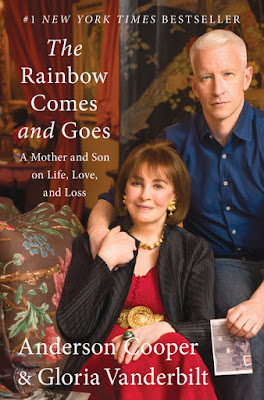Anderson Cooper, Gloria Vanderbilt, and Oral History
 I wish I would have asked insert question here before insert name of person died. We all have uttered those words at one time, and have a tinge of regret when we look back at all those missed opportunities to ask those we love something. Anderson Cooper, journalist and host of CNN’s Anderson Cooper 360, had those same thoughts when his mother and fashion designer, Gloria Vanderbilt, nearly died last year from a respiratory infection. Luckily, Gloria recovered, and Anderson decided to ask his mom all the questions he always wanted to ask and capitalize on the time remaining in both their lives. That conversation changed their relationship, brought them closer together, and eventually became their co-authored book, The Rainbow Comes and Goes: A Mother and A Son on Life, Love, and Loss.
I wish I would have asked insert question here before insert name of person died. We all have uttered those words at one time, and have a tinge of regret when we look back at all those missed opportunities to ask those we love something. Anderson Cooper, journalist and host of CNN’s Anderson Cooper 360, had those same thoughts when his mother and fashion designer, Gloria Vanderbilt, nearly died last year from a respiratory infection. Luckily, Gloria recovered, and Anderson decided to ask his mom all the questions he always wanted to ask and capitalize on the time remaining in both their lives. That conversation changed their relationship, brought them closer together, and eventually became their co-authored book, The Rainbow Comes and Goes: A Mother and A Son on Life, Love, and Loss.When reading this book, I was immediately sucked into the private lives of two famous people who interacted and moved in legendary social circles. Before I began page one, I started out knowing a great deal about Anderson Cooper. My childhood was spent seeing him as a correspondent for the nightly news along with being the host of one of my favorite reality TV shows, The Mole, and by the time I entered college, he had his own show, Anderson Cooper 360. Gloria Vanderbilt was a complete enigma to me, and the only frame of reference I had was that she might have designed blue jeans with a swan logo. This lack of knowledge might stem from me being a 30-something-year-old as Gloria Vanderbilt would have been 60-something years old by the time I was born.
As I began reading, I felt similar to Anderson as someone who barely knew Gloria Vanderbilt and nothing of how the relationship between mother and son worked in their lives. Anderson wrote:
We never had what would be described as a conventional relationship. My mom wasn’t the kind of parent you would go to for practical advice about school or work. What she does know about are hard-earned truths, the kind of things you discover only by living an epic life filled with love and loss, tragedies and triumphs, big dreams, and deep heartaches. When I was growing up, though, my mom rarely talked about her life. Her past was always something of a mystery. . . I didn’t want there to be anything left unsaid between my mother and me, so on her ninety-first birthday I decided to start a new kind of conversation with her, a conversation about her life. Not the mundane details, but the things that really matter, her experiences that I didn’t know about or fully understand.Thus their conversation began, and it prompted an exchange that allowed each one to ask the questions they always wanted to ask but never did. Because Anderson travels extensively for his job as a journalist, their conversation was through e-mail, which Gloria had just started using a few months earlier. Through this medium, it allowed each of them to reflect, craft responses, and cope with the emotions on their own personal timeline. What resulted is a moving picture of what is means to be Gloria Vanderbilt and Anderson Cooper, a memoir worth reading.
As I read this book, I started formulating a list of questions that I want to ask my loved ones. Some are tough questions, and I am afraid that our conversation will end with a response of "I don’t want to talk about it." Having these face-to-face conversations can be described as oral history, and can open the door to learn things about your family and friends that you never knew. But, how do you do oral history? Luckily, the Southern History Department is offering Let’s Talk About It: Oral History as part of its Beyond the Basics of Genealogy workshop series. Oral history is an important part of genealogy. Relatives and family friends are important sources of information. With whom do you want to talk (everyone) and what do you want to ask (everything)? Learn how to gather information from those who have difficulty remembering or are troubled by the past and reluctant to share it. This workshop will be held on Saturday, July 16, beginning at 10:00 a.m. in the Arrington Auditorium. Workshops are free of charge, but registration is requested. To register, contact the Southern History Department of the Birmingham Public Library at 205-226-3665 or askgenlocal@bham.lib.al.us.
Laura M. Gentry
Southern History Department
Central Branch

Comments